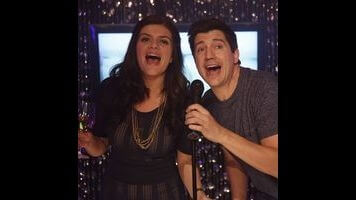Romantic comedies begin with the meet-cute because they are just that: cute. And because happily ever after is easier said than actually shown, especially in the harsh light of reality. Marry Me, though, starts at that midway point between happily ever after and death actually doing the couple part. The meet-cute happens midway through the episode, but that’s not as important as the meltdown that comes in the first scene, the centerpiece of the episode that sets the tone and rhythm for what’s to come. We meet Annie (Casey Wilson) and Jake (Ken Marino) just as Annie is about to throw a shitfit about not being proposed to by her boyfriend of six years on an idyllic vacation, her histrionics distracting her from the fact that Jake is actually down on one knee waiting for his supposed beloved to turn the fuck around. When she finally does, after insulting everyone in his life, including his trash-person best friend Gil (Broad City’s John Gemberling) and bitch of a mother (JoBeth Williams, minus any warmth she exhibited in Poltergeist), Jake asks that same parade of people to come and celebrate their potential union.
It’s a convenient scene, in that it establishes the Annie-Jake dynamic, along with the rest of the rest of the cast, including Annie’s marriage-eschewing best friend Dennah (Sarah Wright Olsen) and her gay dads (Tim Meadows and Dan Bucatinsky). But it also immediately showcases that these people we are about to watch are so over the meet-cute. They know each other’s foibles, their weirdisms and their coping mechanisms. They are not adorable or endearing. Yet, they love each other in spite of that. “Oh, so you’re like a horrible person,” Jake playfully banters with Annie upon their first meeting. “I thought that was clear,” she responds.
That tone of sweetness with an edge (the way Annie puts the emphasis on ‘bitch’ when describing Jake’s mother is a masterful indication of that) is familiar to any faithful Happy Endings fan. Marry Me springs from the mind of Happy Endings’ creator David Caspe, whose jokes are just a bit off without ever feeling like they are off-color, in part due to the affability of his cast. Marry Me isn’t a Happy Endings clone: The characters are less cartoonish than Happy Endings’ purposefully heightened take on the “group of attractive friends hanging out” genre. But there are certain lines that would fit into both worlds. “I didn’t freak out when I caught you masturbating to an Us Weekly of that surfer girl that got her arm bitten off by a shark,” Annie rants to Jake. “I will not apologize for that. Bethany deserves to be treated just like everybody else,” he retorts. That coupled with similar gags about the Challenger space shuttle and the death of Princess Diana announce carry that “bitch” bite throughout.
But that bite is once again tempered with scenes from the beginning of Annie and Jake’s relationship. They may not look like the most stable couple, especially as Annie downs the chocolate covered strawberries strewn across her bed or as Jake gets fired for lying about his father clinging to life so he could go on vacation (sucks to be his boss, his dad is already dead), but scenes from their relationship serve as reminders about why we should actually root for this couple to get together in the first place. It’ll be interesting to see if the flashback structure continues, although it might lose its novelty as the episodes continue.
Marry Me is inspired by Caspe and Wilson’s engagement, so Wilson is particularly adept at the material. But Caspe is also used to writing for Wilson. She carries the pilot on her purposefully wrought shoulders, talking herself through Penny-esque monologues, taking pause only to sing the chorus of “I Will Always Love You.” It’s difficult not to view Annie as Penny placed in a different context (and, to be fair, a scooch toned down). She’s a little bit of a mess who wants to get married as if that will solve all of her problems. She even has the gay dad thing going on. But that’s not entirely a bad thing. This character type fits Wilson’s performance style so well that she takes what could be a grating character who so desperately begs for what every woman supposedly wants: the coveted engagement ring. It helps that Jake wants that future for Annie and himself too, righting the gender cliches that are no stranger to the genre.
Marino’s Jake is not as well-defined as Wilson’s Annie. His calmness and straight man attitude is meant to temper Annie’s freneticism. But Marino has never worked best as a straight man. He’s the guy the straight man rolls his eyes at, from Vinnie Van Lowe to Ron Donald and back to his origins in The State, where the idea of a straightman was entirely unheard of. He’s best when he gets to volley along with Annie, as in defending his desire for masturbatory equality. Happy Endings worked without a straightman because it’s cast was so universally talented and in tune with each other. Marry Me has that same potential. Some of the characters could use some fine-tuning (Gemberling’s Gil and Tymberlee Hill’s Kay need to be defined beyond their strangeness in order to coalesce further) but there’s a wealth of talent in Marry Me, especially when it comes to the Williams, Meadows and Bucatinsky. The groundwork is already there for strong gags from the cast, like Annie’s dads’ debate over whose biological child she actually is. There’s fine-tuning to be done here, but Marry Me has the potential to fill the Happy Endings-sized hole in all of our hearts.









































